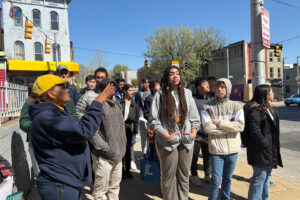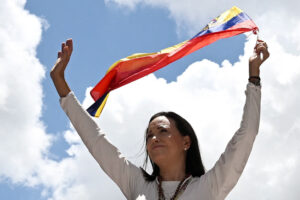
Students in Professor Consuelo Amat’s Introduction to Civic Life course explore what it means to participate in democracy through dialogue, civic reflection, and real-world experience. Many begin the semester unsure of what civic life looks like in practice. By the end, they understand that participation in democracy is what makes it resilient.
Amat, an assistant professor of political science at the SNF Agora Institute, teaches the course to anchor the university’s minor in civic life. The students who enroll bring a variety of academic interests. Some study sociology, while others come from fields such as engineering, applied mathematics, or public health. Many say it’s the first time they’ve taken a class about democracy.
Each semester begins with a reset. “Democracy is not only voting or laws,” Amat tells her students. “It’s how we build trust and listen. How we show up in communities.” From there, the course moves from theory to practice, through conversation, reflection, and experience.
One morning mid-semester, students board a bus to West Baltimore. Their destination: a church basement where community organizers from Baltimoreans United in Leadership Development (BUILD) talk about power, trust, and decades of civic work. After the workshop, the group steps outside for a walking tour through blocks enhanced by local organizing. They pass by former vacant lots, now filled with raised-bed gardens that flourish with vegetables and flowers, and neighborhood schools once slated for closure. Organizers explain how neighborhood victories took root and why the work continues.
For many students, the visit becomes a turning point, where abstract lessons about democracy begin to feel connected to people, neighborhoods, and place. Amat plans to connect more students to BUILD’s leadership training and to the organizers whose stories animate Baltimore’s civic life.
Amat also brings in SNF Agora faculty and visiting fellows, providing students with the opportunity to engage with civic leaders from diverse cultural and national backgrounds. In one session, students meet with David Smolansky, SNF Agora’s Dissident-in-Residence, and a Venezuelan pro-democracy leader who previously served in the Chavez administration. Together, they speak candidly about the risks and realities of navigating and resisting authoritarian rule. Their stories shift the conversation from theory to urgency. No matter the guest, the goal stays the same: help students see civic life as something personal.
Assignments echo that goal. In one unit, students compare how ideologically different news outlets cover the same event. Many read from sources they’ve never trusted. The exercise sharpens their judgment and slows their reactions. Weekly journaling prompts help them notice when course themes emerge in their daily lives. One student reflects on holding back in a family argument, while another practices active listening in a job interview.
When students arrive thinking civic engagement belongs to one political side, Amat invites them to reconsider. She brings in Reed Howard, chief strategy and public affairs officer at Future Caucus and a United Methodist pastor, to speak about his work with young lawmakers across the country. His experience spans local, state, and national politics within the Republican Party, and his efforts focus on bridging divides and building a healthier democratic culture. His visit challenges assumptions and demonstrates to students that democracy thrives through a diversity of voices and beliefs.
In another session, students meet with Tabatha Pilgrim Thompson, director of strategic partnerships at The Horizons Project. With a background in organizing, peacebuilding, and movement support, she leads a workshop on homelessness and public dialogue. One student, expecting confrontation, instead finds common ground.
“We disagreed on the cause,” she said, “but we both cared deeply. That changed how I saw the conversation. I stopped trying to win and started trying to understand.”
Amat views her classroom as part of a broader effort to help students transition from learning about democracy to living it. “Democracy thrives when people trust their neighbors and feel empowered to take action,” she says. “Every person has a role to play in building that kind of civic life.”

